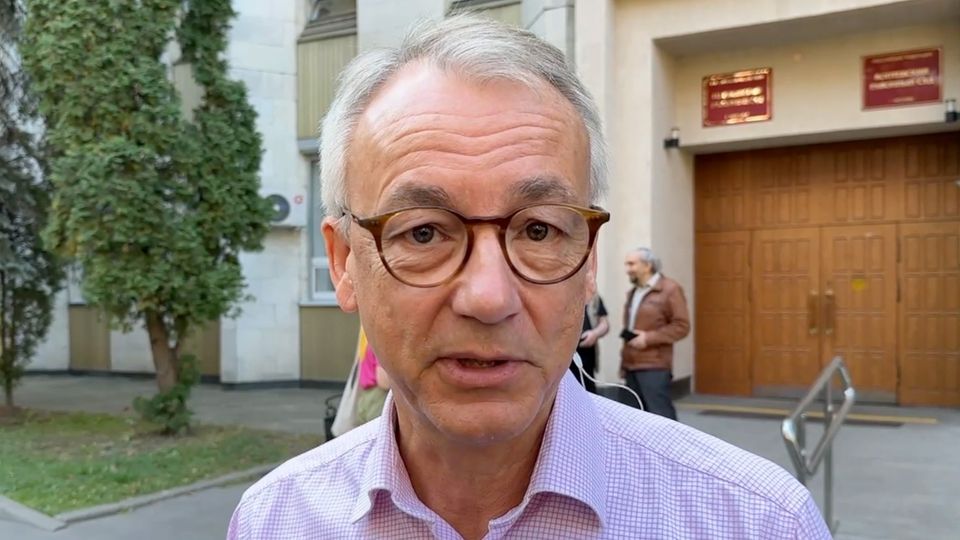Russia treats critics like criminals. Now the judiciary wants to put human rights activist Oleg Orlov from the Memorial organization behind bars – in an extremely confusing process.
Oleg Orlov has already packed his prison bag just in case. There are sneakers without laces, a warm jogging suit and a bit of food. “Of course I’m afraid,” says the Russian human rights activist in an interview with the German Press Agency. Because he criticized Russia’s war against Ukraine, the 70-year-old faces several years in a prison camp. It doesn’t help that Orlov is internationally known or that his organization Memorial, now banned in Russia, was awarded the Nobel Peace Prize.
Orlov, who formerly headed Memorial’s human rights department, has brought his prison bag to court several times – and then took it home again. The trial, which has been going on for months, is now in the Russian headlines because of strange twists and turns.
Oleg Orlov is said to have discredited the Russian army
It all started more than a year ago with an article in which Orlov criticized the war ordered by Kremlin leader Vladimir Putin under the title “They wanted fascism, they got it.” For this he was accused in his homeland of “discrediting” the Russian army – but international solidarity was great. “The price that he and others pay for exercising their right to freedom of expression in Russia is intolerably high,” complained the organization Amnesty International. But then – surprisingly for many – Orlov was initially only given a relatively mild fine of 150,000 rubles (around 1,500 euros).
In a subsequent appeal process, no harsher verdict was made in mid-December; instead, the judge decided to reopen the trial from scratch. It is currently unknown when this will happen. What is clear, however, is that the Russian justice system can still put Orlov behind bars, because that is what the public prosecutor’s office is actually demanding.
One can only speculate about the background to this unusually complicated procedure. After all, since the beginning of the invasion of Ukraine, numerous other war opponents in Russia have been sentenced to sometimes long prison sentences in much quicker trials. Internationally, they are generally classified as political prisoners.
From the perspective of the judiciary, was there a mistake made in Orlov’s case? Was it some kind of faux pas by a Moscow district court that was not previously particularly experienced in political proceedings? Orlov thinks this is possible. In the actual trial, the public prosecutor’s office simply did not bring forward any tenable allegations, and in the indictment in the appeal proceedings, completely new ones suddenly emerged. But these were “very strange” and “very badly written,” he remembers. Such a “self-revealing” document raises the suspicion that it was written in great haste and under pressure from the Kremlin, he says.

“You get the impression that they wrote these lies with their left foot,” says the human rights activist. Despite the seriousness of the situation, Orlov seems somewhat amused as he talks about the trial on this winter day. It is bitterly cold outside, inside Orlov is sitting in front of a large wall of books in a patterned wool sweater.
Specifically, he said, he was accused of “discrediting the use of the army to protect the interests of the Russian Federation, its citizens, and international peace and security.” “I said in court that I think that the deployment of the army to Ukraine contradicts the interests of Russia and its citizens. I am a citizen of Russia. And it contradicts my interests.” Orlow clearly enjoys describing how he and his lawyers dismantled the prosecutor’s argument piece by piece.
Prison camp hangs over Orlov’s head like the sword of Damocles
Orlov is a man of principles. The original verdict was not only contested by the public prosecutor’s office, but also by himself. “I said from the beginning: I would challenge any guilty verdict. Even though I was advised against it,” he says. “They said: Why are you doing this? That’s such a lenient sentence.” But for him the matter was clear because: “I am not guilty of what I am accused of.”
So while the threat of imprisonment in a prison camp hangs over his head like the sword of Damocles, Orlov carries on as best he can. It is already too late to flee abroad because the Russian judiciary has banned him from leaving the country in light of the ongoing proceedings. Although he has long since retired, he now works for an association that he and other former Memorial members founded. Among other things, they create lists with the names of political prisoners in Russia, currently more than 630. They also offer contact points for politically persecuted people.
Career of a dictator
From the moth to Putin, the Eternal – the bloody path of the Kremlin master in pictures
But because they can no longer officially register their new organization as a legal entity in Russia, only a fraction of the previous work is possible, says Orlov. The placement of lawyers, for example, is only possible in exceptional cases; and cooperation with the European Court of Human Rights – previously a cornerstone of Memorial’s work – is on hold. “It’s all very complicated,” says Orlov.
Nevertheless, he does not regret staying in Russia. “I see this court case as part of my work. And so far this work has been very successful, very effective,” says Orlov. “Because in the course of the process we received a lot of attention.” But he also admits: “The price is high.”
Source: Stern
I have been working in the news industry for over 6 years, first as a reporter and now as an editor. I have covered politics extensively, and my work has appeared in major newspapers and online news outlets around the world. In addition to my writing, I also contribute regularly to 24 Hours World.




